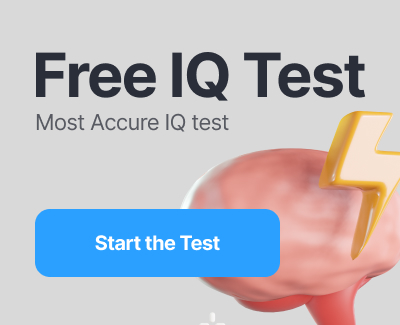
A high IQ score opens many doors, from getting into top universities to securing employment opportunities. It also helps you excel in your field of interest and pursue career opportunities that match your level of intelligence.
However, specific IQ scores only work for some jobs and careers; and the level of intelligence required for different jobs and career paths varies greatly depending on the type of job and its requirements.
Therefore, you may sometimes need a certain IQ level to work in some positions, and you need to know these levels.
If you are interested in this topic, this article is for you. In this blog, we will discuss the average IQ scores required for various jobs and how to increase your IQ if needed.
The IQ Level You Need for Different Jobs
One important factor you must note is that applicants must perform better than other students on IQ tests to be considered for academic positions. Because as you know, high scores on IQ tests indicate a high level of intelligence and help you get into top universities.
There is no single IQ level you can target for all jobs, but most jobs require a score of 100-120 on the IQ scale; and to be considered a senior, you must score at least 85 on an IQ test.
Moreover, the applicant’s score on the IQ test also determines the position the applicant can get. If you score higher than others your age, you are more likely to reach top positions in academic positions and elsewhere.
Therefore, if you want to be successful in life, aim for high scores on IQ tests; you can do this by improving your cognitive skills, reasoning abilities, etc.
Ranges of IQ Scores
The average IQ score ranges from 85 to 114, but it’s important to remember that this score is only one component of the intelligence test.
Several factors are considered when determining an individual’s intelligence level, including age, education level, and test scores.
Besides, it is also important to consider the test context, such as question types, duration, and test structure.
Additionally, average scores can be deceptive, especially if you take a test of high or low difficulty; for example, if a test is designed to measure intelligence within a certain range, an average score of 100 might represent average intelligence for that person.
However, an average score of 130 can indicate someone with very high intelligence if that score represents someone who performed exceptionally well on a test designed to assess intelligence across a broad range.
So, as you can see, various things affect the range of IQ levels, and there are no identical conditions.
Average IQ Levels in Different Age Groups
Average IQ levels decline with age, which means success in today’s fast-paced and competitive job market requires people with higher IQs.
Plus, it’s important to understand that different types of jobs require different intelligence levels to succeed. And not everyone with different age ranges can perform perfectly in all job positions.
For example, college-level jobs require average intelligence, high-level jobs such as management and leadership often require higher intelligence, and jobs involving creativity and problem-solving may require above-average intelligence.
Understanding the average IQ level required for success in different job sectors can help individuals maximize their career potential and make better decisions.
Which IQ Scores are Required for Other Jobs
As mentioned earlier, different job positions require different intelligence scores, and for some jobs, high-IQ individuals are preferred over low-IQ individuals.
You should know that jobs like criminal investigators, software developers, and mathematicians all require high intelligence on average.
To land these jobs, prospective employees must perform well on general intelligence tests such as the SAT and ACT. But there are other jobs where you can do well even with a low IQ test score.
For instance, customer service representatives need knowledge and skills that can be developed through training and experience; and a high IQ score helps applicants find jobs with good salaries and benefits, but it is not required for all jobs.
Below, we look at desirable IQs for some major occupations:
Social Scientists

The average score required for a social scientist varies by function, title, and location. For example, advanced analytical and critical thinking skills found in managerial and technical positions typically require a score of at least 130.
Moreover, research-oriented positions typically require an average of 145 points; and values of 110 and above are common for lower-level analytics roles.
Besides, the average IQ score required for a social scientist also depends on the job you’re applying for, function, position, location, etc.
For example, lawyers typically require an average IQ score of 120, while sales professionals may require an average IQ score of over 125.
Mathematicians, Biochemists, and Chemists
The required IQ score range for mathematicians is 130-160. For bio-chemists, the score required ranges from 130 to 170, and Chemists require a score between 110 and 170.
These results are necessary to be able to perform complex tasks in these areas, and potential candidates must be able to perform complex calculations, solve problems and make important decisions.
A high score may also indicate that the candidate has the intelligence and skills necessary to succeed in their chosen field.
In general, jobs in this category require a higher level of IQ than other jobs, so people who want to work in these fields must have special skills. Because the higher the IQ level and the more abilities they have, they can perform better and be more successful in these jobs.
Biologists
Biologists working in different fields with different responsibilities require different IQ scores. For instance, biologists in academic and research-oriented careers require a minimum score above 115 or 120. Besides, non-academic biologists may require higher scores depending on their occupation.
Additionally, biotech and pharmaceutical companies often need highly intelligent individuals to oversee research projects and lead teams of scientists.
Plus, biologists need a high degree of intelligence to conduct complex experiments, evaluate data, and accurately predict experimental outcomes.
A high level of intelligence is also essential for a biologist to be successful in the profession, and it’s common for biologists to ask for an IQ score above 115 or 120.
In some cases, higher scores are preferred by scientists because they allow them to think more clearly and quickly when solving complex problems.
However, no single score can be used to determine a biologist’s intelligence level; it is how well you do in the interviews and tests your employer requires.
University Professor

University professors score between 97 and 135 on IQ tests, which means they have a high level of intelligence but are also capable of complex reasoning.
Those with a high IQ score are more likely to be successful in academic settings, as they can better understand complex problems and develop creative solutions. They can also be more likely to accurately assess their knowledge, abilities, and strengths.
However, high school teachers score between 92 and 127 on IQ tests; and these scores indicate that these individuals have average intelligence but can also understand simple concepts and solve common problems.
Those with a high IQ score are likely to be effective educators, as they can provide adequate instruction and monitor student performance effectively.
Can You Increase Your IQ Score?
The answer to this question can be yes! You can increase your IQ score by doing quality brain training. There are many different types of brain training with different focuses and approaches.
For example, memory activity improves memory and helps improve thinking and language skills. Other activities include games such as sudoku, crosswords, puzzles, physical activities, or instrument playing.
Moreover, you can also try computer-based cognitive training programs such as memory training or number and letter tasks.
You may also engage in visuospatial thinking activities to develop your ability to perceive, understand, and analyze objects in the world.
Conclusion
Now that you know the average IQ score required to achieve academic status, we hope you can use this information to improve your performance and IQ score.
But remember that improving your IQ is not easy; it takes a lot of time and effort to understand concepts and improve your logical thinking skills.
Start with getting enough sleep and eating well. Plus, getting someone who knows science to help you with your studies would be even better!
